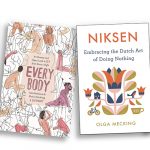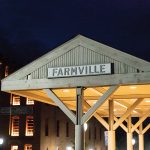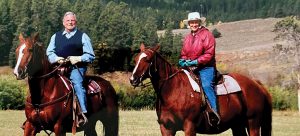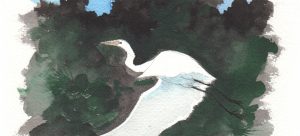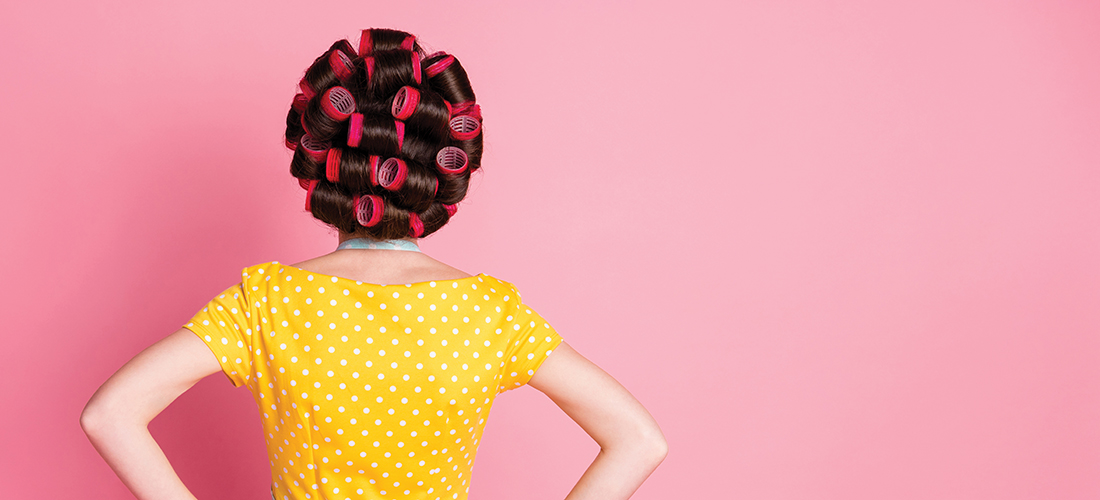
In the Hotseat at Aunt Ruth’s
I served my time and, frankly, would have preferred the aliens
By Cynthia Adams
Truvy’s Beauty Spot in Steel Magnolias equipped its Natchitoches, La., patrons to meet life with sky-high hair. But the Franklin Beauty Shop in Monroe, N.C., where my aunt delivered hard truths and even harder hair, was a very different place.
My Aunt Ruth’s shop, which opened in the 1950s, was an assault upon all the senses. It possessed the stark ambiance of a morgue. And it taught me this: Beauty is in the eyes, ears and nose of the beholder.
It was as utilitarian as my father’s barber shop: stark, fluorescent lights, pea green walls, Army green vinyl floor, three mirrors, three stations, three chairs outfitted with massive dryers and two manicure tables.
Large windows with open metal Venetian blinds (why was something so hideous called Venetian?) overlooked Franklin Street. Passersby could peer directly into her place, which, unlike the barber shop, emanated noxious chemical smells.
Incredulously, my aunt made a decent income and won devoted friends. It was ideally situated near the Oasis Sandwich Shop, which served fab sodas, floats, fries and burgers. There, I would idle while my mother got her “do.”
Even as a child, I understood that my mother was not improved by the ministrations of my aunt. Her hairdos might just as well have been created with tongs and barbecue tools.
Any fool could see she looked better going into the Franklin, as we called it, than she did leaving it. The drive home was confirmation as my mother dusted ditches raking a brush through her shellacked hair, “trying to fix this before we get home,” she’d scoff, as the green Olds swayed across lanes.
Mama was never, ever pleased by her sister’s work.
Ruth, a natural beauty, loved the natural world and could have been a botanist. But her school principal father stubbornly steered her into cosmetology, where she studied the darker arts of beauty.
Why oh why?
He died before I was born or I would have asked.
Her customers’ hair was more often than not dyed or bleached an unnatural shade of blue-black, red or yellow, curled tight, then baked into place beneath oversized dryers suitable for flood recovery operations.
Clients emerged pink faced from the blasting heat of the silvery green stationary dryers and then submitted to the next step: a comb out. This involved teasing with a rat-tail comb before the requisite (lethal) final step: Spray Net.
Hair sprays of this era contained vinyl chloride, a propellant later proven to be carcinogenic. Hard fact.
Another hard fact: My aunt’s clients looked uniformly alike once they climbed out of the sturdy swivel chair.
By Ruth’s hands, my grandmother’s hair became a blue-black hue I rarely observed in nature, apart from a rare beetle specimen at the Natural Science Center.
It puzzled me why anyone paid Aunt Ruth at all.
Speaking of payment, I privately yearned to operate the large green cash register that stood at the entry with the appointments book, watching as customers wrote out checks and waved goodbye “till the next time.” Instead, I thumbed through worn Photoplay and McCall’s magazines in the waiting area.
At age 10, when many of my friends were getting a Toni perm in their kitchen, it was decreed: my straight ponytail was inadequate. Aunt Ruth would give me a professional do before my new school year.
She washed my long straight hair, then mixed toxic chemicals in a glass bowl. As they stewed, she clipped and chopped.
Once the carnage was over, the remaining hair was tightly wound around bright pink perm “rods,” a term co-opted from nuclear physicists. Perm rods are to perms what uranium rods are to nuclear reactors. Either way, they’re volatile.
She applied chemicals to the perm rods. A black hair net held it in lock down.
I was walked to a dryer where this tragic concoction was to “set.”
Under the dryer, my eyes stung from the putrid reaction. When my scalp and ears began burning from the blasting heat, I jumped out. But Aunt Ruth ordered me back, lowering the dryer temp to nearly tolerable.
The timer pinged and I sprang free. As the rods were removed and my head cooled, I studied the clock: it was now half past my childhood.
Ruth swiveled the chair toward the mirror.
The shock caused me to bite my lip so hard it bled.
I looked precisely like my grandmother.
My mother was tense as she swung onto the highway. A stifling ammonia cloud filled the car. I cracked the window to cool my face, still hot and now overwhelmed with the enormity of my strangeness. “Don’t worry. My hair can’t move,” I said.
Once home, my father took one look and moaned. “Dear Lord. The child’s ruined.”
Devastated, I shuffled out of the house to the barn in search of Trigger, a gentle pony who cocked his head quizzically before accepting a hug. I climbed into the loft, where I did my best thinking, cried a little, then concocted a story owing much to Rod Serling and The Twilight Zone.
I was playing outside when a space ship landed in the pasture. Aliens zapped me. A lot of my hair burned off right there! I’m just lucky to be alive.
It wasn’t exactly original or believable, but an improvement on the story I invented about how I needed a life-saving operation after peeing myself on the playground.
Bus #15 swung down our road the next morning, where I waited in a plaid skirt and white blouse, holding a new book satchel, bracing myself. Johnny swung the bus door open; there it was — his open-mouthed surprise. But I turned away and searched the aisle for Martha or Kenneth.
They would totally buy my story about my hair-today, gone-tomorrow alien abduction. OH
Cynthia Adams is a contributing editor of O.Henry magazine.

